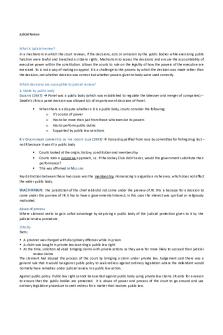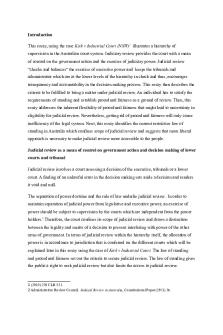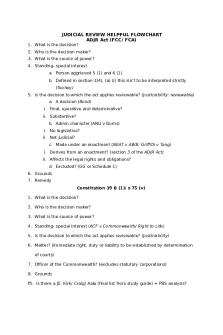Ilegality - Judicial Review PDF

| Title | Ilegality - Judicial Review |
|---|---|
| Author | Rahat Khan |
| Course | LLB |
| Institution | University of London |
| Pages | 5 |
| File Size | 130.2 KB |
| File Type | |
| Total Downloads | 112 |
| Total Views | 143 |
Summary
Judicial Review...
Description
Public Chapter 15b slides Slide 1 : Administrative Law: Judicial Review Illegality
Slide 2 : Council of Civil Service Unions v Minister for the Civil Service "Judicial review has I think developed to a state today when ...one can conveniently classify under three heads the grounds on which administrative action is subject to control by judicial review. The first ground I would call 'illegality', the second 'irrationality' and the third 'procedural impropriety'." ...That is not to say that further development on a case by case basis may not... add further grounds...[e.g.] the possible adoption in the future of the principle of 'proportionality'". (per Lord Diplock at 410)
Slide 3 : What is Illegality? According to Lord Diplock, 'illegality' means: "that the decision-maker must understand correctly the law that regulates his decision-making power and must give effect to it," and this is "par excellence, a justiciable question to be decided, in the event of dispute, by those persons, the judges, by whom the judicial power of the state is exercisable."
Slide 4 : Overview - Illegality (sub-divided) MISTAKE OF/EXCEEDING JURISDICTION Simple ultra vires (excess of powers) Errors of Law Errors of Fact FAILING TO EXERCISE DISCRETION Unlawful delegation Fettering of discretion
ABUSE OF DISCRETION (Unlawful use of (discretionary) powers) Relevant & irrelevant considerations Improper purpose INFRINGEMENT OF CONVENTION RIGHTS (s.6 HRA 1998)
Slide 5 : The Ultra Vires Rule Public body exceeds powers given to it = classic case for JR Attorney-General v Fulham Corporation [1921] 1 Ch 440 Local authorities' statutory powers (under Baths & Wash-houses Acts) did not extend to running a commercial laundry business. R v Richmond upon Thames Council, ex p McCarthy and Stone Ltd [1992] 2 AC 48 Council imposed charge for giving (pre-application) advice re planning applications Held: the charge was unlawful - it was not 'reasonably incidental' to the council's planning powers.
Slide 6 : What is discretion? "a public officer has discretion whenever the effective limits on his power leave him free to make a choice between possible courses of action or inaction" (K C Davis) Basic rule: public officials entrusted with discretion cannot rid themselves of it (i.e. discretion must not be 'fettered')
Slide 7 : Failure to exercise discretion 1. Unlawful (or unauthorised) delegation ('delgatus non potest delegare') Fettering of discretion: 2. Self created rules of policy (British Oxygen) 3. Failing to exercise discretion (Padfield) 4. Acting under dictation (Lavender)
Slide 8 : Unlawful delegation ('delgatus non potest delegare')
A public body may delegate a power (to make a decision) only if the delegation is authorised by law otherwise by allowing another person to take a decision for them, they are giving their power away hence fail to be properly accountable Barnard v National Dock Labour Board [1953] 2 QB 18 Power to suspend dockers delegated to port manager instead of exercised by local board = unlawful Exception = the Carltona principle (Carltona Ltd v Commissioners of Works Ltd [1943] 2 All ER 560)
Slide 9 : Fettering of discretion: Self-created 'rules' of policy Public body must ensure it has not fettered its discretion by applying a very rigid policy as if it were law British Oxygen Co v Board of Trade [1971] AC 610 Lord Reid: a large authority may have had to deal already with many similar applications and then it will have evolved a policy so precise that it could be called a rule. There can be no objection to this, provided the authority is always willing to listen to anyone with something new to say."
Slide 10 : Fettering of discretion:Failing to exercise discretion Padfield v Minister of Agriculture, Fisheries & Food [1968] AC 997 public authority given discretionary powers must actually exercise discretion
Slide 11 : Fettering of discretion: Acting under dictation If public body allows its policy to be dictated by another this can = fettering its discretion H Lavender & Son v Minister of Housing and Local Government [1970] 1 WLR 1231 Housing Minister in planning appeal followed the policy of Agriculture Minister who wanted land to be preserved for agricultural purposes
Slide 12 : Abuse of discretion 1. Relevant & irrelevant considerations 2. Improper purpose
Slide 13 : Abuse of discretion: Relevant & irrelevant considerations Simon-Brown LJ identified three types of factors in: R v Somerset CC ex parte Fewings [1995] 1 WLR 1037 those factors which MUST be taken into account (mandatory) those factors which must NOT be taken into account (prohibitory) discretionary factors which the decision-maker may have regard if, in his judgment, he thinks it is right to do so (here court will not interfere unless the decision is unreasonable).
Slide 14 : R v S of S for the Home Dept, ex p Venables [1998] AC 407 HL held that in his decision on length of sentence for the two children who had been found guilty of the murder, the Home Secretary had failed to consider some relevant factors and taken account of some irrelevant ones: had misdirected himself in law by considering an irrelevant consideration (public protest/media campaign concerning the sentences to be imposed); had ignored relevant considerations (progress & development of individuals whilst detained).
Slide 15 : Abuse of discretion: Improper purpose Power should be used for its proper and lawful purpose - any action contrary to the express or implied purpose of power = unlawful Congreve v Home Office [1976] QB 629 Wheeler v Leicester County Council [1985] AC 1054 Mixed motive? Westminster Corporation v London and NW Rly Co [1905] AC 426
Slide 16 : Infringement of Convention Rights HRA 1998 extends grounds of JR... s.6 Human Rights Act 1998 provides: "It is unlawful for a public authority to act in a way which is incompatible with a convention right" This will apply unless primary legislation means that the authority could not have acted differently....
Similar Free PDFs

Ilegality - Judicial Review
- 5 Pages

Judicial Review
- 15 Pages

Judicial Review
- 50 Pages

Judicial Review
- 6 Pages

Judicial Review
- 40 Pages

Judicial Review
- 7 Pages

Judicial Review Complete 2
- 54 Pages

Judicial Review (ALL!)
- 8 Pages

Judicial Review- irrationality
- 4 Pages

Judicial Review notes
- 1 Pages

Analisis Sejarah Judicial Review
- 5 Pages

ADMIN LAW Judicial Review
- 5 Pages

Judicial Review Notes
- 6 Pages

Judicial Review Essay
- 3 Pages

Judicial Review Flowchart
- 4 Pages
Popular Institutions
- Tinajero National High School - Annex
- Politeknik Caltex Riau
- Yokohama City University
- SGT University
- University of Al-Qadisiyah
- Divine Word College of Vigan
- Techniek College Rotterdam
- Universidade de Santiago
- Universiti Teknologi MARA Cawangan Johor Kampus Pasir Gudang
- Poltekkes Kemenkes Yogyakarta
- Baguio City National High School
- Colegio san marcos
- preparatoria uno
- Centro de Bachillerato Tecnológico Industrial y de Servicios No. 107
- Dalian Maritime University
- Quang Trung Secondary School
- Colegio Tecnológico en Informática
- Corporación Regional de Educación Superior
- Grupo CEDVA
- Dar Al Uloom University
- Centro de Estudios Preuniversitarios de la Universidad Nacional de Ingeniería
- 上智大学
- Aakash International School, Nuna Majara
- San Felipe Neri Catholic School
- Kang Chiao International School - New Taipei City
- Misamis Occidental National High School
- Institución Educativa Escuela Normal Juan Ladrilleros
- Kolehiyo ng Pantukan
- Batanes State College
- Instituto Continental
- Sekolah Menengah Kejuruan Kesehatan Kaltara (Tarakan)
- Colegio de La Inmaculada Concepcion - Cebu
